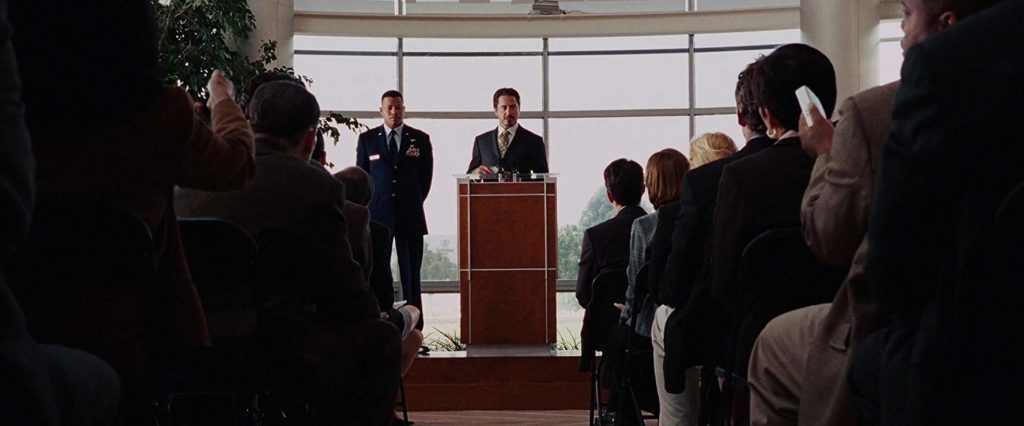One of the many ways in which Iron Man changed the superhero genre was with its ending. After the film’s explosive events, Tony Stark is being prepped for a press conference by Agent Coulson of S.H.I.E.L.D., where he must deny any culpability by claiming that Iron Man is his bodyguard (the traditional cover story in the comics). However, once on stage and facing the prospect of being a hero, in an act of either responsibility or egoism, Stark declares to everyone: “I am Iron Man”.
It is a defining moment in the MCU, a line that came back around eleven years later in Endgame, and shocked viewers for how it disregarded the traditional secrecy of superheroes. From then on, none of the MCU heroes would have a secret identity, and many of them would not even have a codename (Wonder Woman, Scarlet Witch and Hawkeye are never actually called that in the films themselves). Some of this is just source material – while characters like Captain America and Thor have had secret identities in the comics, those identities were never essential to their characters, and have mostly been abandoned by their comic writers since the 2000s.

As the films went on, this trend would continue. Ant-Man reveals himself as Scott Lang upon first meeting Falcon, ending the first film with his whole family (including his parole officer) knowing about his extra-curricular activities, and is under house arrest in Ant-Man and the Wasp because his identity is public knowledge. Black Widow is essentially a S.H.I.E.L.D. Agent without a home life, Black Panther is a globally recognised state leader, and Doctor Strange is just his real name.
Such characters don’t exactly require a secret identity, but it goes beyond the MCU. On Netflix’s Defenders, only Daredevil is actually concerned about his double-life, Jessica Jones and Luke Cage never bothering with other aliases. Secret identities were once integral to the CW’s ‘Arrowverse’ but now, in The Flash essentially everyone (including his main villains) knows Barry Allen’s identity, and Green Arrow has been publicly unmasked.
Turning to the DCEU, Man of Steel merely touches on the creation of a dual-identity, ending with Clark Kent’s job at the Daily Planet – glasses and all. Fast-forward a few years to Batman v. Superman, and alter-egos have become so inconsequential that Lex Luthor figures out both Batman and Superman’s identities off-screen, while neither Wonder Woman nor Aquaman even have disguises.
There are exceptions, of course, especially for teenage superheroes. Shazam! and most Spider-Man films stress the importance of secret identities, even if the former sees most of the main characters discover Billy Batson’s secret. And now, Far From Home’s mid-credit sequence shows Mysterio frame Spider-Man for murder and, with the help of a returning J. K. Simmons as J. Jonah Jameson, outs him as Peter Parker. The only MCU character to lead a double-life has now been undone.

So why is this happening? Most basically, it might be the same reason why the ‘Arrowverse’ stopped secret identities a few seasons in; it’s been done. Lying to your loved ones to protect your identity is so cliche and predictable that it’s now almost unbearable. Indeed, the drama of a superheroes’ double-life was so well executed in Superman: The Movie, Spider-Man 2 and The Dark Knight that it does not warrant repeating.
Another reason is the lack of consequences that come from revealing identities. In traditional superhero stories, heroes are vigilantes working outside the law, so exposure will mean their arrest. From Iron Man onwards, this is no longer a threat, since while there is a trial in Iron Man 2 over Tony’s actions yet nothing ever happens. Captain America is actively celebrated, as is Black Panther and most other heroes. Even Spider-Man works alongside the police, hence why Mysterio had to expose him and frame him, since he’d probably survive just the former. There are not enough daily threats to these superheroes for them to be concerned about secret identities.
Another typical reason for secret identities is the protection of their loved ones, who might become endangered if their enemies knew their true identity. But this issue doesn’t really exist in most recent superhero films, perhaps as an unforeseen casualty of a shared cinematic universe. In the MCU, supporting characters are also sidekicks. When Stark’s home is threatened in Iron Man 3, it’s mostly alright since his best friend is War Machine and his (future) wife is Rescue. Steve Rogers’ two best friends are also superheroes. While Thor calls the Hulk a “friend from work” in Thor: Ragnarok, none of them really have friends outside the job (even Thor’s other friends are all Gods), meaning there isn’t the traditional separation between the fantastic and mundane found in superhero stories, and thus no need for two identities.

So, most modern superhero films aren’t interested in the choice between the normal and the amazing. Aquaman spends his whole film in the mystical underwater Atlantis, with no one to return to on the surface (except maybe his dad). Captain America’s former friends were all left in the ‘40s, as were Wonder Woman’s in the ‘20s, Captain Marvel was abducted from Earth, and the Guardians of the Galaxy simply live in space, and do not have costumes or codenames (save perhaps for Star-Lord, which is mocked when first introduced). Yet this option to have a ‘normal life’ is exactly what the MCU’s Spider-Man films, especially Far From Home, was about… but now the choice has been taken from him. It’s superpowers being presented as both wish fulfillment and moral burden – you cannot choose one and forsake the other.
The exclusion of civilian lives is not inherently a bad thing, but it does threaten to take superheroes away from their emotional core. Criticisms that their films can feel too slight and quippy are only exacerbated when they’re populated with only fantastical people, never allowing for a ground-level view of these heroes. Although not exactly a secret identity, Hawkeye’s family and farm in Age of Ultron did show a domestic side, which paid off to great effect in Endgame. Without this crucial perspective on our favourite characters, seeing what makes them inspirational icons rather than powered police, might be lost.
Peter Parker was also unmasked in the comics, during their original ‘Civil War’ storyline (which required superheroes to register their secret identities, something that would not come to pass in the MCU adaptation). It provided some interesting storylines, particularly when people who knew both sides of Spider-Man, like J. Jonah Jameson or Flash Thompson, found out they were the same person – until it was eventually undone (by making a deal with the Devil).
The reveal in Far From Home will probably be more permanent, and will likely push Peter to embrace his superhero responsibilities at the expense of his home life (not that it stopped Stark at all). Of course, Aunt May finding out at the end of Homecoming didn’t change anything, so maybe Peter will morph more into a Harry Potter-style hero, a known celebrity who must balance his life with the expectations around it. Let’s just hope that everyone finding out about Peter Parker means Spider-Man does not lose this human side of himself.
